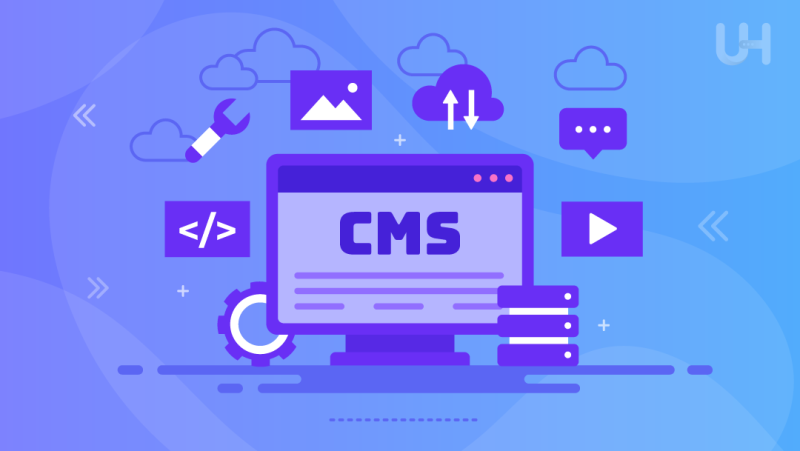Have you ever wondered how websites organize their content so smoothly? This is because of the content management systems (CMS). CMS simplifies the complex by being the helping hands that manage all of your digital content creation. In this article, we’ll go through CMS’s types, benefits, and examples so you can easily manage your websites.
Enhance collaboration and get complete control of the online space that’s just for you. Learn about the different types of CMSs, from the Wix & Squarespace type systems to popular choices like WordPress or Joomla. We’ve cracked the code to manage the digital presence easily, so let’s get started.
What is a Content Management System?

A content management system is a software that handles all the technical aspects of creating a website, such as helping users create, manage, modify, and publish the content. You don’t need to have any knowledge of coding to create a website with the help of a CMS.
A CMS is a centralized database that helps companies or organizations manage their content digitally. It enables businesses to distribute their content in a convenient and cost-effective way, without the need to invest in a dedicated, full-time content development team.
Types of Content Management Systems (CMS)
Almost all the CMS consists of a front end and a back end. The part the user interacts with is the front end, which deals with the styling and visible structure of the website. CSS, JavaScript, and HTML combine to give a rich, interactive display that matches your company’s branding
On the other hand, the back end of a CMS deals with the publishing of new content in a straightforward manner. Choosing the right backend technology for your project is essential. With the right backend, you can simply post your content on an interface similar to Microsoft Word. The content is stored in a database and published on the front end of the website. Partnering with a professional CMS development services provider can further enhance your platform by ensuring seamless integration, custom functionalities, and optimized performance to meet your specific business needs.
The following are some types of content management systems that are highly trending in today’s market.
- Coupled CMS: A traditional CMS that acts like an all-in-one solution offers a fully accessible back end for publishing and modifying content. It requires installing and maintaining specific technologies and dedicated web hosting to run.
- SaaS CMS: A software-as-a-service or SaaS CMS is a hassle-free cloud-hosted solution that eliminates the need for setup and web hosting. It’s perfect for companies wanting a basic web presence that lets them quickly create, manage, and distribute content without worrying about servers.
- Decoupled CMS: In a decoupled CMS, the presentation of the website is separated from the back end, and the two are connected with an API to transport data. This sophisticated approach allows an organization to be flexible in how it uses back-end content, which can easily be repurposed across many applications while maintaining its form and consistency in the back end.
- Headless CMS: A headless CMS consists only of a back-end system connecting to a database, with custom front-end applications fittingly paired. It is well suited to the organization desiring total control over content access and storage. It enables users to broadcast content to any desired front-end, whether a website, mobile app, or any other interface.
Key Features of a Content Management System
Some of the key features that a CMS offers are:
- User Account Administration: In a CMS, you can create an unlimited amount of user accounts, each with a unique ID and varying levels of access to different pieces of content.
- Content Generation and Modification: The best CMSs include a WYSIWYG (What You See Is What You Get) editor that empowers users with no technical knowledge to generate and modify digital content. This can take the form of text, as well as video and images.
- Version tracking: CMSs give you the ability to track changes and revert back to prior versions of content when necessary.
- Templates and Themes: With a CMS, you can quickly assign a pre-designed theme or template to your website or product in a matter of minutes, preserving a common look and feel across your branded products.
- Media Handling: A CMS allows you to quickly and safely manage all types of media, including images and videos.
- Search Capability: A CMS has a variety of native search and filter tools to help you quickly find the content you’re looking for within the system.
Get The Best CMS Hosting Solution With Low-Cost Rates!
Looking to elevate your business website? UltaHost offers a powerful hosting solution that makes it simple and inexpensive to build your website. Save big without compromising on quality!
Benefits of Using a CMS
A content management system has benefits that are not only limited to market or content authors but also to business owners and IT teams. Some common benefits that a CMS offers are as follows:
Easy Content Creation and Publishing
A CMS has a user-friendly interface, which helps simplify the process of creating content and publishing. No technical or coding experience is required to manage content on your website, making it one of CMS’s most significant advantages.
In a content management system, there are several easy-to-use tools that you can leverage to edit or create web pages, articles, blog posts, or any other type of content. This way, you can create high-quality content without having any external help from a technical person or a web developer. And by doing so, developers can use their freed-up time to focus on other areas of work.
Streamlined Workflow and Collaboration
For an organization or a team of content creators, a Content Management System, or CMS, is an ideal way to centralize an entire content workflow. Multiple users can collaborate across any location, working on different parts of the website at the same time and keeping track of any content approval processes.
Content marketing professionals could be building a content repository, while developers could be working on integration with bespoke code. A good CMS also allows roles and permissions to be as straightforward or custom as you need. Different types of content creators can contribute without having to know HTML, while an editor can edit copy, while an administrator manages the overall health of the environment.
Built-in Search Engine Optimization (SEO) Tools
Optimizing your website for search engines is necessary to boost your visibility and have any hope of drawing in organic traffic. Fortunately, a Content Management System (CMS) often comes with integrated SEO features or plugins, greatly simplifying the process of fine-tuning your content for search engines.
With tools such as customizable Meta tags and URLs, XML sitemaps, and canonicalization, a CMS serves you very well in elevating your site’s SEO performance and, thus, making it more available to potential visitors.
Efficient Content Organization and Management
A CMS helps when your content requirements and the amount of content you need to handle are growing relentlessly. A Content Management System (CMS) provides the infrastructure for collecting, organizing, and overseeing your content.
Content organized through tags, labels, and metadata provides flexibility for performing searches, applying filters, and retrieving data as needed. A well-organized CMS also includes content scheduling, version control, and archiving to manage the present, manage your updates, and show how your knowledge has evolved.
Consistent Branding and Design
Establishing a consistent brand appearance and design across various platforms is a key element in creating a polished and identifiable online identity. A Content Management System (CMS) offers self-service options for customizing templates, themes, and design components so they are aligned with your brand standards.
This means you get to use pre-established and customizable layouts and styles for the unification of visual elements across your website and connected channels such as Facebook or your blog. Every good marketer should understand that consistent and seamless brand components will improve brand identity and user engagement.
Scalability and Flexibility
Getting new pages, sections, or functionalities on the website is also no longer a technological torture, and that’s thanks to Content Management Systems (CMS). CMS allows you to incorporate plugins, extensions, or modules from its ecosystem of capabilities. That way, as your business grows, you’re able to expand your presence on the web without the need for a developer or programmer.
Example of CMS
WordPress is a prime example of a well-known content management system. There are a variety of other content management systems. Still, WordPress is the leading content management system, claiming a market share of 62.5% of known content management systems.
It’s important to specify that by “WordPress,” we refer to WordPress.org — the home of the authentic open-source WordPress content management system, not WordPress.com. Some other popular content management systems include:
- Joomla
- Webflow
- Drupal
- Shopify
- Weebly
- Magento
- Ghost
- Squarespace
- Wix
With WordPress having a large share of the market, it’s tough to opt for any other CMS. Although it wouldn’t be right to say that WordPress is the best CMS of all, each one has certain advantages to offer. You can decide for yourself which CMS fits best to your business requirements by reading our comparison guide on:
Choose The Right CMS For Your Business
For teams of all sizes, creating personalized content at scale can be a huge responsibility. Technological impediments can stand in the way of company growth and create team silos between marketing teams and developers. This future-proofs your content strategy as you evaluate CMS for the future. A flexible CMS supports your need for an omnichannel marketing strategy while simultaneously unburdening your content and developer workflows and allows for optimization, personalization, and automation that creates more meaningful customer experiences.
If you decide to use WordPress CMS, remember to check out Ultahost’s WordPress hosting plans, which are tailored to your business needs. Ultahost’s WP hosting solutions are precisely built to maximize speed and performance.
FAQ
Who uses a CMS?
A Content Management System (CMS) proves valuable for anyone involved in creating, administrating, and publishing digital content. Individuals, businesses of all sizes, organizations, and institutes benefit from employing a CMS. It helps save time and resources when creating and managing websites.
Do I need CMS for SEO?
Many people think Google decides how high your website appears in search results, but it depends greatly on the system you use to manage your content (CMS). When search engines evaluate your site, they look at its performance and the HTML elements on each page. This is why having a CMS that’s good for SEO is really important.
How does a Content Management System work?
A CMS provides a user-friendly interface for individuals to create and edit website content. It typically involves a backend (admin panel) where users can input and organize content and a frontend where visitors see the published content. The CMS stores and manages data in a database, separating the content from the website’s design.
Are there security concerns about using a content management system?
Security is a crucial consideration when using a Content Management System. While popular CMSs often release security updates to address vulnerabilities, it’s important to stay vigilant. Some measures to enhance the security of your website include regularly updating your CMS, using strong passwords, and implementing security plugins.










